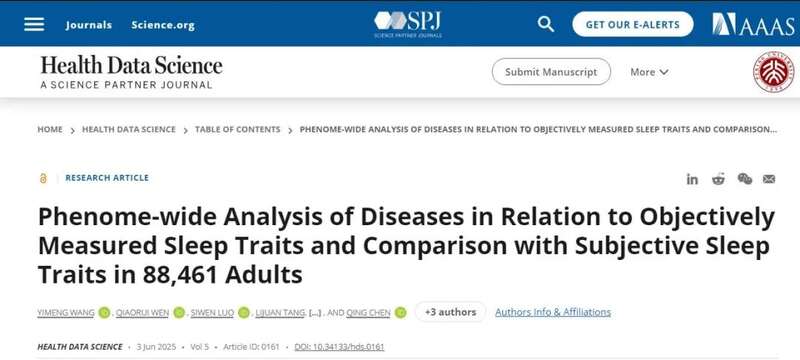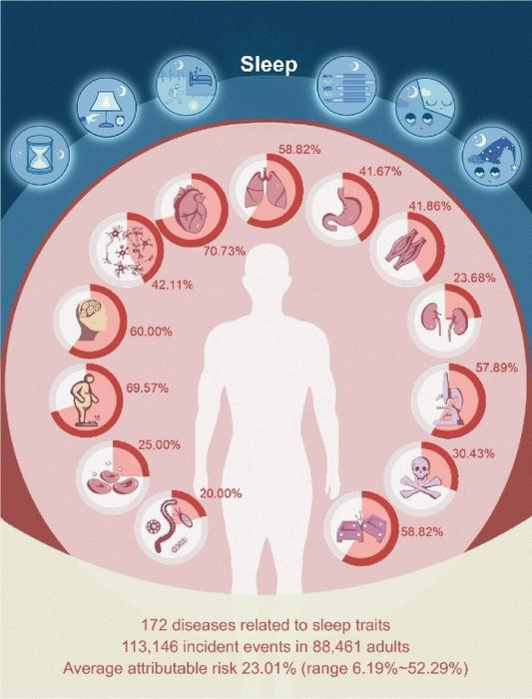2025-08-22
Not wanting to sleep at night and not getting up in the morning, many people use overdrawn sleep to make up for the insufficient time during the day, which can eventually wear down the body.
According to a study in Health Data Science, there is a significant association between sleep characteristics and 172 diseases.
Based on new research and the opinions of multiple experts, Life Times has compiled a list of "sleep deprivation" alerts issued by the body:
Poor sleep is related to 172 diseases
Researchers from Peking University and Third Military Medical University included sleep data from 88461 adults in the UK Biobank.
They found that sleep has multidimensional characteristics from sleep data, including nighttime sleep duration and start time, sleep rhythm, and sleep fragmentation (sleep efficiency and wakefulness frequency).

During an average follow-up of 6.8 years, researchers found that 172 diseases were associated with sleep characteristics, with 42 diseases having at least doubled the risk of developing them; More than 20% of the risk of 92 diseases is related to bad sleep behavior, such as Parkinson's disease, type 2 diabetes and acute renal failure; It is worth noting that 83 diseases are associated with sleep rhythms.

Yu Huan, chief physician of the Department of Neurology at Huashan Hospital affiliated with Fudan University, said that to judge whether one's sleep is satisfactory, the following indicators can be referred to:
Good sleep depends on the "five degrees"
Sleep duration: Generally, adults require 6-8 hours of sleep per day, while children and adolescents have more sleep needs, with slight differences throughout the year. Under regular sleep patterns, waking up naturally in the morning with high energy levels meets the standard.
Sleep speed: Normally, one should fall asleep shortly after going to bed and enter deep sleep within 20-30 minutes after falling asleep.
Sleep depth: Deep sleep typically accounts for 15% to 25% of the entire night's sleep duration (calculated based on 7 hours of sleep per night, 60 to 100 minutes of deep sleep), mainly in the early middle of the night. Not sleeping in the early middle of the night or frequently waking up at night may reduce the proportion of deep sleep throughout the night.
Daytime activity level: When waking up in the morning, one should feel refreshed and energetic. During the day, attention is easy to concentrate and fatigue will not occur after a short period of work.
Frequent dreaming: Dreams are a normal phenomenon of sleep, but if the intensity of the dream causes repeated awakenings, palpitations and night sweats during awakenings, fatigue due to the dream, or abnormal movements accompanying the dream, it indicates a hidden danger.
Poor sleep, whole body organs working overtime
Tong Chengguang, chief physician of the Brain Disease Department at Xiyuan Hospital of the Chinese Academy of Traditional Chinese Medicine, said that long-term lack of sleep will put the body in "overtime mode" and cause a series of abnormalities.
Hormonal disorders
The secretion of thyroid hormones, sex hormones, melatonin, and other hormones follows a certain pattern. If one does not sleep when they should, this rhythm will be disrupted, affecting hormone secretion. Hormonal disorders can in turn affect sleep quality, forming a vicious cycle.
Immune imbalance
Lack of sleep can put the human body in a state of stress, leading to an imbalance in the immune system, which cannot recognize and eliminate potential pathogens to resist infections, inflammation, etc., resulting in a significant decrease in disease resistance.
Inflammation release
Lack of sleep provides the soil for inflammation to grow, and over time, it can trigger a systemic inflammatory storm, becoming the driving force behind metabolic diseases, cancer, mental illnesses, and other illnesses.
Brain degeneration
Research has found that long-term sleep deprivation can seriously affect brain functions such as language comprehension, memory, emotion regulation, and decision-making ability. Long term insomnia can also lead to brain hypoxia, promoting the accumulation of metabolic waste such as beta amyloid protein, thereby inducing dementia.
Cardiovascular and cerebrovascular diseases
Sleepiness is a common symptom in patients with cardiovascular and cerebrovascular diseases, especially in the middle and late stages of the disease or when the condition is severe. This is due to the narrowing and occlusion of the patient's blood vessels, which affects blood circulation.
Nervous system disease
In clinical practice, 70% to 80% of Parkinson's disease patients have sleep disorders and feel strong drowsiness during the day; Alzheimer's disease patients have a reduced clearance rate of beta amyloid protein in the brain, which accelerates cognitive decline, loses normal perception and control of sleep and wakefulness time, and becomes drowsy during the day and unable to sleep at night.
Mental and emotional disorders
Patients with depression, anxiety disorders, schizophrenia and other diseases have an imbalance of neurotransmitters in the brain, which can easily lead to problems such as excessive sleep.
8 "micro" signals of sleep deprivation
Dr. Shelby Friedman Harris, Director of Behavioral Sleep Medicine at Montefiore Medical Center in New York City, USA, has summarized the "sleep deprivation signals" and reminded people with this condition to adjust quickly.
1. Lie down and fall asleep immediately
According to research data from the American Association of Neurological Disorders and Stroke, people who frequently fall asleep within 5 minutes of lying down may have severe sleep deprivation or even sleep disorders.
2. More impulsive than usual
Suddenly falling in love with sweets and impulsively shopping may all be due to a lack of sleep. Lack of sleep can seriously affect the prefrontal cortex of the brain, which is mainly responsible for judgment, impulse control, visual practice, and attention. Lack of sleep can lead to decreased judgment and impulsive actions.
3. loves to say clichés
When lacking sleep, people often find it difficult to have spontaneous and complex language, and are more prone to problems such as unclear speech, using clichés, stuttering, and monotonous speech.
4. More forgetful than ever before
Adequate sleep helps to consolidate memories and improve emotions. Lack of sleep can lead to difficulty in forming memories, unclear logical thinking, and inability to think deeply and act rationally.
5. More likely to cause hunger
When sleep is insufficient, people find it even harder to resist the temptation of unhealthy foods such as potato chips and ice cream. The reason is that lack of sleep can affect two key hormones in the human body - leptin and auxin, thereby increasing people's desire for food.
6. Read a sentence twice
When reading books or newspapers, a sentence often needs to be read or read twice, which is a sign of lack of concentration and sleep. A study published in the American journal Sleep found that insufficient sleep can lead to decreased attention and weaken people's instant decision-making ability.
7. clumsy and clumsy in doing things
Lack of sleep may lead to problems such as unstable walking, lack of coordination in limbs, and stumbling when doing things.
8. Sleeping during the day
It's easy to fall asleep while driving or watching movies in the cinema during the day, which means you may need to catch up on sleep. When you have sufficient sleep, you should be alert and energetic during the day, and it is not easy to fall asleep immediately even in a dark or dull environment.
When unable to sleep, it is recommended to try the following techniques
Create a good sleeping environment: The sleeping space should be spacious enough to ensure that the body can stretch during rest. The temperature should be controlled between 15.6 ℃~21.1 ℃, and the light source should be moved out of the bedroom or turned off. The bedroom should be equipped with a blackout curtain.
Develop good sleep habits: maintain regular bedtime and wake-up times, exercise moderately every day, bask in the sun, and do yoga exercises that can relax the whole body at night.